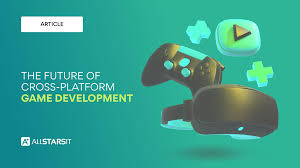The gaming industry has seen remarkable evolution over the past decade. One of the most transformative trends shaping the market today is cross-platform gaming. This innovation allows players to access and enjoy the same game across different devices, whether it’s a PC, console, or mobile device. The implications of this shift are far-reaching, changing how developers design games, how communities interact, and how players experience digital entertainment.
What Is Cross-Platform Gaming?
Cross-platform gaming refers to the ability for users on different hardware platforms to play together in real-time. For example, a player on a PlayStation can team up or compete with a friend on an Xbox, PC, or mobile device. This is a significant leap from the traditional model, where players were restricted to their own platform ecosystem.
Benefits for Players
- Unified Gaming Communities
Cross-platform capabilities eliminate the fragmentation of player bases. Gamers no longer have to convince friends to purchase the same console or device to play together. This creates larger, more vibrant communities and reduces waiting times for matchmaking in online games. - Flexibility and Convenience
Players can switch devices without losing progress. Imagine starting a game on your PC at home and continuing on your mobile device while commuting. This convenience enhances user engagement and retention. - Enhanced Game Longevity
By connecting more players across platforms, developers can sustain larger active communities, which helps a game maintain relevance for years. Popular games like Fortnite and Minecraft have thrived thanks to cross-platform support.
Benefits for Developers
- Broader Audience Reach
Developers can attract more players without limiting their audience to one platform. This increases revenue potential and brand visibility. - Streamlined Updates
Cross-platform design often requires unified updates and patches, making it easier for developers to maintain game quality across devices. - Innovative Monetization Opportunities
Games can integrate cross-platform economies, offering virtual currencies, skins, and items that travel with the player across devices. Even niche markets, such as qq poker and gacor online games, are benefiting as players now enjoy these experiences on both mobile and desktop seamlessly.
Challenges and Future Prospects
While cross-platform gaming is transforming the industry, it comes with challenges. Developers must manage differences in hardware capabilities, control schemes, and network performance. Additionally, maintaining fair competition between platforms is crucial.
However, the future looks promising. Cloud gaming, AI-driven matchmaking, and advanced server technologies are making cross-platform gaming smoother and more accessible. As a result, the gap between different gaming ecosystems is shrinking, and the industry is moving toward a more inclusive, connected gaming experience.
Conclusion
Cross-platform gaming is not just a trend—it is a fundamental shift in how games are designed, played, and monetized. By breaking down barriers between devices, it enhances player experiences, strengthens communities, and opens up new business opportunities. Whether you are a casual gamer enjoying qq online slots on your phone or a hardcore PC player, the future of gaming is connected, flexible, and more exciting than ever.

